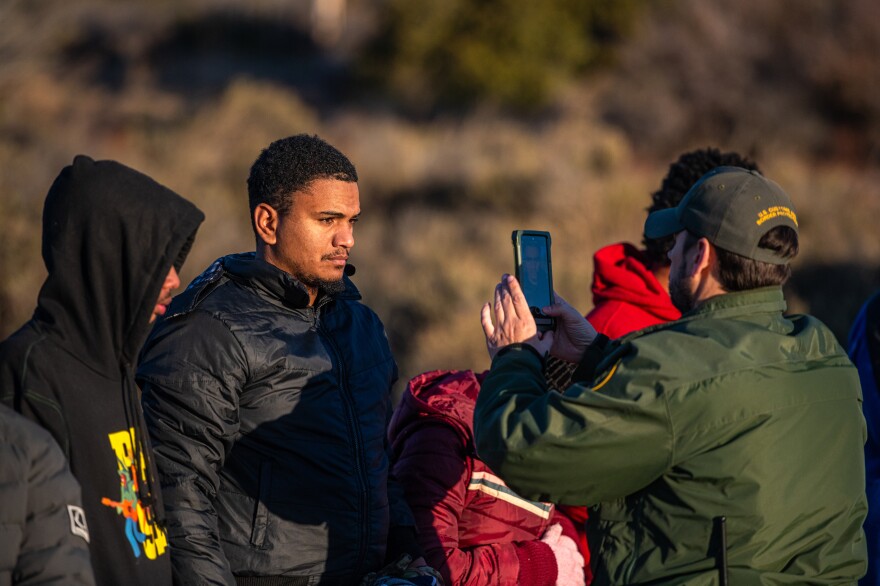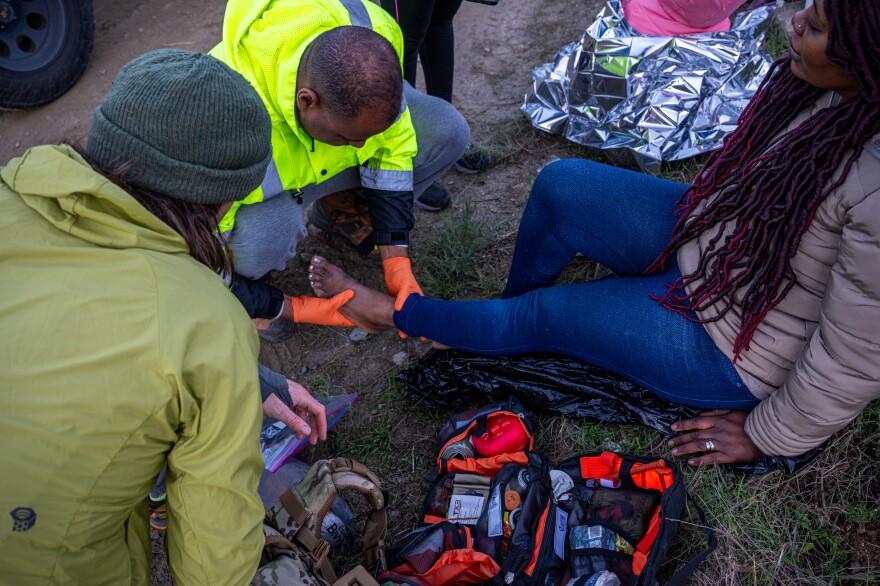A little over a month ago, the small California community of Jacumba, on the U.S.-Mexico border, was a scene of chaos.
Hundreds — sometimes as many as a thousand — migrants, including children, were stuck in open-air camps for hours and even days on end to await processing by U.S. Customs and Border Protection. They had little access to water, food, shelter or even bathrooms. Local townspeople told NPR they felt overwhelmed.
"We're seeing seizures, diabetic emergencies, broken bones, burns, lots of burns," said local resident and volunteer Karen Parker.
Just a few weeks later, the situation in Jacumba has changed dramatically. The camp is still there, and those inside are no less desperate. But the numbers are down sharply, and local residents say that is just part of the story.
When NPR returned to Jacumba earlier this month following an investigation last year into unofficial migrant detention camps, it was much colder. In one of the camps, a few feet away from the U.S.-Mexico border wall, amidst piles of trash, several dozen families, including small children, huddled around crackling makeshift bonfires. Kurdish, Mexican, Bangladeshi, Colombian and Dominican families spoke about how they had crossed the border a few hours earlier and were waiting to be taken by border agents for processing.
As she tried to warm up by the fire, a woman named Eli sobbed while remembering her son, who she said was killed recently by a drug cartel in Zacatecas, Mexico, where she's from. She fled with six family members. They asked that we withhold their last name, for fear of retaliation.
"All we want is to stay together, and stay alive," Eli said.

At sunrise, Border Patrol arrived. An agent instructed everyone to put out their bonfires. And a bus took everyone for processing. Once they left, the camp was deserted, just piles of trash, empty makeshift tents and some smoldering fires.
CBP declined to address specific questions about the Jacumba camp, but following NPR's investigation in November the agency provided a statement saying that its "officers and agents prioritize the health and safety of all those they encounter."
Locals say the decrease in border crossings and people being held at the camps, started around early January, and came practically overnight.
"Up until a week ago we were having people dropped off in the camps all during the day and night," said volunteer and local resident Sam Schultz. "At this point the numbers are just 10% of what they were before."


What Schultz described has happened along the border. A spike in unauthorized crossings in December, followed, government sources say, by a dip in January.
U.S. officials have told NPR that the dip is related to a series of meetings in late December between the Mexican government and White House officials regarding immigration enforcement. Nothing official was announced following the meetings — in fact Mexican President Andrés Manuel López Obrador publicly criticized U.S. immigration policy after the meetings, saying that only addressing the root causes of migration (poverty, violence, repression) can work.
But, official sources have told NPR that the Mexican National Guard is ramping up its enforcement. Suddenly, you can see them from Jacumba on the other side of the border fence.
"I've seen them now very often," said Schultz. "I've seen them actually arresting people on the side, and taking them away. Yeah. They're there."
It would hardly be the first time that Mexico has increased immigration enforcement following pressure from the U.S. It was a strategy during both the Trump and Obama administrations.
But advocates say historically, it's a strategy that simply pushes desperate people to cross through more dangerous routes.

The day after visiting the camps in Jacumba, NPR headed west to Otay, a 3,500-foot mountain that separates Mexico from San Diego. We were tagging along with a group called the Borderlands Relief Collective, a humanitarian group that leaves water and first aid for migrants.
The landscape in Otay is distinctly different from Jacumba.
"It is an arduous, dangerous trek," explained volunteer Joseph Hauser. "Where we're gonna go is a path typically taken by people who are not looking to be found."
Hauser has been doing this work for about a year, but said "I've only really started running into people when we come out here in the last month, month and a half."
It was still dark out when we started driving up the mountain, but we barely made it a few miles before being intercepted by two women and a toddler. They were from Nigeria and Guinea and had been hiking for around five hours. The mother was sobbing — her feet were starting to give out. The 3-year-old was quiet. It was freezing, and the aid workers worried the three of them might be in danger of hypothermia.


As aid workers wrapped her in an emergency thermal blanket and gave her fluids, another family came down the mountain. They were from Ecuador and had a 6-year-old. They too had crossed overnight.
Edwin didn't want to provide his last name because his family was crossing without papers. "Look," he said, "I'm scared. I'm scared that if I get caught, who will take care of them?"
He said throughout his journey up north through Mexico there were forces from the Mexican National Guard. He said they just wanted bribes.

Edwin said he was warned about the rough terrain that he and his family would have to endure, but that he felt an urgency to attempt the journey anyway.
"We kept hearing about how hard the border is getting. You could get deported. Too many people. So, we did this instead, and turned ourselves over to the will of God," he said.
After volunteers tended to the migrants, we continued up the Otay mountain. The terrain got steeper and more slippery. About an hour later, in a crevice on the side of the mountain, there was an altar. It was filled with candles, rosaries, a bible, money offerings in foreign coinage and images of Saint Toribio Romo, patron saint of migrants.
One of the images contained this text: "Protect my family, now that I have had to leave them behind ... allow me to come back home soon."
Copyright 2024 NPR. To see more, visit https://www.npr.org.



